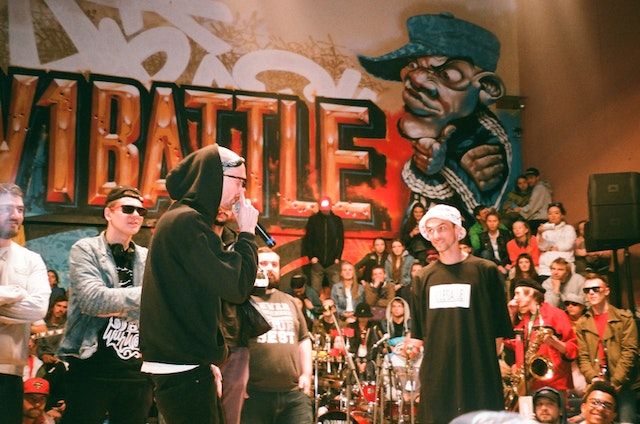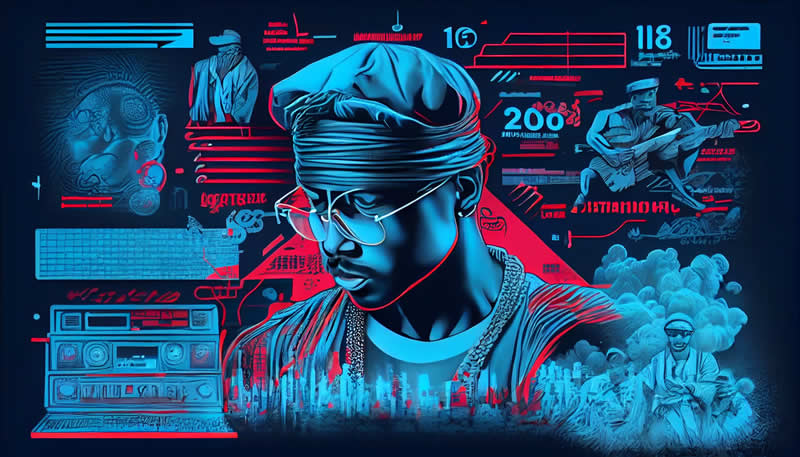Brief history of hip-hop music
Hip hop is a very popular, influential genre of music that has its roots in the Bronx, New York City. The exact origins of hip hop are unknown, but DJ Kool Herc is widely credited with being the first person to use DJ equipment (turntables) at a block party in 1973.
Since then, hip hop has evolved into many different styles and subgenres over time. Here's some information about the history of hip hop music.
It is widely agreed that hip hop started in the Bronx, New York City, in the late '70s
It is widely agreed that hip hop started in the Bronx, New York City, in the late '70s. It has gone on to become one of the most influential forms of music worldwide and a central part of American popular culture.
At its core, hip hop is an artistic expression rooted in four elements: rapping (or MC-ing), DJing/scratching, breakdancing and graffiti art (which includes writing).
All four components have evolved over time as artists have incorporated new elements into their music—from funk samples to jazz chords—but they remain essential to hip hop's distinctive sound.
There are many different styles of hip hop today. Some artists focus on rapping while others specialize in scratching or beatmaking while still others combine different genres like rock with rap beats or even classical compositions with pop melodies.
While its popularity may wax and wane over time, there seems no doubt that this genre will continue to evolve due to its ever-shifting influences among both musicians and audiences alike.
The origins of hip hop are widely attributed to DJ Kool Herc, who began beatmatching and scratching records at a block party in 1973
In the Bronx in 1973, DJ Kool Herc was playing records at a block party and noticed that when he played two copies of the same record at the same time, it sounded like rhythm. He began experimenting with different ways to manipulate these beats and create his own music.
In the late 1970s and early 1980s, hip hop started to emerge as a fully formed genre of music as DJs began making their own recordings using turntables and samplers.
In 1979, The Sugarhill Gang released its first single "Rapper's Delight," ushering in an era of mainstream popularity for hip hop music that continues today.
Since then, hip hop became a huge part of American music and popular culture
Since then, hip hop has become a huge part of American music and popular culture. It's a genre of music that originated in the Bronx, New York City, in the late 1970s.
Hip hop is not just about rap, it also encompasses a variety of styles including spoken word poetry and dance performance art forms such as breakdancing and popping.
Some people even include the music industry itself under hip-hop culture because many artists come from poor neighborhoods where they live through their lyrics so they can make money to help their families out financially.
There have been many different styles of hip hop since then
Since the emergence of hip hop in the 1970s, it has been greatly influenced by many different genres of music. Hip hop's influences include funk, disco, soul and jazz. It has also been influenced by many different cultures and countries around the world.
In particular, hip-hop's early days in New York were shaped by the sounds of Jamaican reggae artists such as Bob Marley and Peter Tosh, beatboxing pioneers Doug E Fresh & Slick Rick, as well as rappers Run DMC and Kurtis Blow (who was actually from Boston).
The language used in hip-hop lyrics varies across regions too. For example, In English speaking countries like England or America, MCs speak in a more relaxed rhythmical style called "flow" while they often use slang words like "yo" or "bruv".
You may even hear a British MC say things like “chav” which means an uneducated young person who dresses or speaks inappropriately.”
Hip hop exploded in popularity after rap group Run DMC's collaboration with Aerosmith on "Walk This Way”
The song won a Grammy award and marked the first time a hip hop group had collaborated with a rock band. Its success opened the door for other artists to collaborate across genres, including Grandmaster Flash & The Furious Five's "The Message" (1982) and Public Enemy's Fear of A Black Planet (1990).
Hip Hop music has become more musical and complicated.
Rap music has become more complex and musical over time. It has also become more mainstream, international and diverse. Hip hop is now a global phenomenon that encompasses many different genres, including R&B, reggae fusion (e.g., dancehall or raggaeton), Latin rap/hip hop (e.g., salsa), pop rap/hip hop (e.g., bubblegum) and alternative hip hop/rap (e.g., punk rap).
Hip-hop artists are increasingly using their music as a platform to express their political views and other social issues such as poverty, police brutality etc…
Rap's popularity has fluctuated over the years but it is still very popular today.
Despite its popularity, hip hop has had its ups and downs. Some people were not down with the style of rapping at first, but it grew in popularity over time.
Today, there are many different types of hip hop music that are still very popular. Some rappers have been inspired by earlier styles while others have created new genres using elements from different styles to create something new.
The same can be said for rap music: It's still very popular today! Many people enjoy listening to rap because it allows them to express themselves through their words and music as well as share what they have been thinking about lately through their lyrics (or rhymes).

Rap has become more musical than before due to influences from other genres such as jazz or rock which helped make it more complicated than just talking fast over beats made on drum machines (though this was an important part too).
So, it is impossible to definitively state where hip hop began. However, it is clear that the genre has continued to evolve since its inception in the 1970s and remains an extremely popular form of music today.
Artists who have been influenced by hip hop include Michael Jackson, Madonna and Lady Gaga. The genre has also had a global influence on many other cultures around the world with artists such as MC Hammer (USA), The Sugarhill Gang (USA), KRS-One (USA) and so on.
Brief history of hip-hop music - Conclusion
We hope that you enjoyed learning a little bit more about hip hop's history. It's a very interesting topic, and we are always pleased to see people getting interested in it.
If you liked this post and would want to read more general information about the music industry, please visit our blog section.
You're here because you love music, so please try to listen to it together with your friends or strangers, at the same time, connected by webcam in CalypsoRoom.
In CalypsoRoom we believe music is the most powerful tool to bring people together, and for this reason, we developed an online music social network where you can connect with friends or strangers while listening to music simultaneously, connected via webcam.
Are you a music artist or label and do you want to give your music a further dimension? Do you own or co-own the master and publishing rights to your music? If yes, consider to post it on CalypsoRoom: it’s free, you keep 100% of your copyright, you promote your music in a new way, and you get a new revenue stream! Check it out.
Thanks for reading,
CalypsoRoom Team
back
Written by CalypsoRoom Editorial Team
The CalypsoRoom Editorial Team is a skilled and diverse group of writers, researchers, and industry specialists who have access to Calypso's data and information in order to give you broad knowledge about the music industry as well as helpful advice to help you manage your music and dancing career.
Updated January 2023
Company number: 681223
James's Walk 31, Dublin, Ireland
contact@calypsoroom.com
+353 (89) 435 8928





